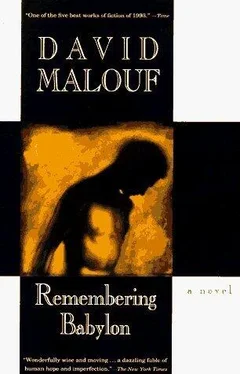George Abbot, at his desk in the schoolroom, had a pile of papers before him and a pen in his hand. More lives, Gemmy thought, that out there somewhere held others in their spell.
He seemed a different figure, this man in his shirtsleeves with his shirt open and the pen in his hand, from the youth he sometimes saw at the kitchen table. He was in his role here of sorcerer. He felt the power of that in him even at Mrs Hutchence’s, where he was called George. He was not what he seemed.
He recalled the old harshness with which, in the days when he had followed Lachlan and the girls to school, the man had driven him away. He had smelled on him then an aversion that came from the blood, and was not convinced by the familiarity he had begun to show him or the attempts he made at kindness. It was not done for his benefit — or so he thought — but to impress Leona.
A man may have two natures. Here at his desk the schoolteacher was in the other darker and more powerful one, seated before a pile of papers, with at his elbow the bottle with the spirit that smelled of earth.
George Abbot, looking up from his tedious corrections, was surprised to see Gemmy at the window. He was startled. How long had he been there? He felt a kind of goosepimpling at the intensity of his look. The fellow seemed sick, out of himself. He got up quickly and helped him in.
It took him a little time to understand what he wanted. His garbled speech, all stutters, made no sense, and he thought at first he must be delirious. He was asking for people George had never heard of, or so he thought, till one name, Willett, struck him, and he remembered some bit of what, nearly a year ago, he had set down, and in this very room too. It was then that he grasped it. He wanted that — that piece of writing. He wanted it back. Well he did not have it, of course. Mr Frazer did. Mr Frazer was in Brisbane.
‘This, Gemmy?’ he asked, holding up one of the exercises he had been correcting.
Gemmy, looking rather sly, reached out and, not quite grasping, relieved him of it. George was surprised at himself. At the ease with which he let it go.
Gemmy raised the sheet to his nostrils and sniffed, and a look George Abbot could not have defined, but would never forget, spread over his features. He waited in expectation, and George, more out of curiosity than anything else, or to see the look again, offered him a second sheet, then another, till seven of the ill-written exercises, all blotches and scratchings out, had passed from his hand to Gemmy’s.
‘What do you want them for?’ he asked.
Gemmy looked at him gravely and did not reply. He slipped the papers into his pocket and George, inwardly, shrugged. Useless, he decided, to demand them back.
‘You should go home now, Gemmy,’ he said gently. ‘They’ll be worrying about you. Do you want me to come with you?’
He shook his head, and began, alarmed perhaps, to get up, but tottered.
‘Here, let me get you something,’ he said. ‘A slice of bread — some water.’
The man sat again and he went quickly into the little room behind the blackboard and cut a thick slice of bread, poured a mug of water. He was only gone a moment. But when he came back to the schoolroom, with the plate in one hand and the mug in the other, Gemmy was gone. Puzzled, he set the bread and water down, and went back to his corrections — or what remained of them. What would he tell Jeff Murcutt and the rest, whose exercises, sweated over in the narrow desks, turned this way and that to get a better purchase on the paper, grimed with dirt, smeared with ink, filled painfully with what he had knocked into their skulls, he had allowed Gemmy — just like that — to walk off with.
Since he had begun to love but also to forget himself a little, the world and everything around him appeared in a new light. He regarded Gemmy very differently now from when he had sat at the table here, an unwilling schoolboy, and taken down the ‘facts’ Mr Frazer dictated. Gemmy had repelled him then. Something in the muddiness of his eye, the meaty stench he gave off, a filth, ingrained, ineradicable perhaps — most of all in his cringing eagerness to please, had challenged his belief that suffering, even of the most degrading sort, would bring out the best in a man, and that the spectacle of it must inspire noble sentiments. Well, no noble sentiments had come to him when he was faced with Gemmy. If what had survived in this brutish specimen was, as Mr Frazer appeared to believe, naked essential humanity, then it was too little. He held his nose. He wanted no part of it. What a high-minded, fastidious little theorist he had been. Was youth an excuse? Unhappiness? He no longer thought so.
Part of the affront he had felt as Mr Frazer agonised over the greasy rag of a man, who had never perhaps been more than a plain imbecile, was that in all the time he had been here, he had never once shown any feeling for him .
But there had been something deeper, even then. It was the fear that Mr Frazer, for all his embarrassing effusions, might be right. That what they were dealing with, in Gemmy, might be closer to them, to him , than he knew. Mr Frazer had accepted that from the start — he paid that much tribute to the man. He, choked by the stench of the suggestion, by what he felt as its blackening touch upon him, had fought it, but come round at last. He felt humbled now; and most of all when Gemmy, recalling no doubt the persecutions he had used against him, shrank at his approach. He saw — it was still himself he was thinking of, it was the only way he could grasp what others felt — that there might be something after all in mere endurance. He would have liked to break through the silence that kept Gemmy apart from them, find what it was in him that had made that possible, discover what had been done to him, beyond what was visible in the marks he bore, the one eyebrow that gave him his quizzical, wren-like look, that had harmed him in one part and in another had not, so that he had at moments, and most of all when he appeared merely dumb and ox-like, a kind of grandeur that went painfully to the heart.
‘Grandeur’ was the word that came to him, and he did not reject it. It did not seem too large for what he saw at times in a man who had been kicked from one side of the world to the other, not even knowing perhaps what part of it he was in, except that he was there in his own skin. That, the skin, is what he had come down to from the realm of noble sentiments.
They were in a place, a continent, where it was mere naked endurance perhaps that best revealed the qualities of men. And that might be true of every place, when the fabric of pageant and the illusion of noble sentiments had been ripped away. In any event, he cared enough for Gemmy now to lay his corrections aside and set off for Mrs Hutchence’s, to see the fellow had got safely home. If he hurried, he thought, he might catch him up on the road.
Leaving the schoolhouse, Gemmy paused a moment, the papers safely in his pocket, and as he looked about him, felt for the first time that he could go any way he pleased; he did not have to go back down the ribbon of road.
To the north, beyond the swamp and its band of ti-tree forest, the sky was a smoky glow, cloudless because what filled it was a single cloud, blooming with a light that might have been that of the fallen sun, its ashes shaken out now and even the deep core failing. The forests up there had all day been climbing into the sky and drifting down again to cover all this side of the range with ash; a breath out of the heart of the country. There was no finality in it. He knew that. One life was burned up, hollowed out with flame, to crack the seeds from which new life would come; that was the law. The seasons here were fire, ash, then the explosion out of blackened earth and charred, unkillable stumps, of springy shoots and loose-folded, sticky little leaves; the hard seed tormented with flame till it splits, springs open, then a hissing as the first raindrops plump and spatter, and the new forest, leaf by leaf in its old shape, ghostly at first in its feathery lightness, breathes out of charred sticks and smoulder in a season too long to be measured by days or moons or by one man’s life or many.
Читать дальше












